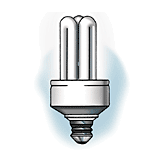Energy!

Energy is one of the most fundamental parts of our universe. We use energy to
do work. Energy lights our cities. Energy powers our vehicles, trains, planes
and rockets. Energy warms our homes, cooks our food, plays our music, and gives
us pictures on television. When we eat, our bodies transform the food into
energy to do work. When we run or walk, we "burn" food energy in our
bodies. When we think or read or write, we are also using energy.
But our energy use has had a huge environmental impact. This impact is the
greenhouse effect. Burning fossil fuels to generate electricity or heat produces
carbon dioxide, which is the main greenhouse gas. If you want to reduce the
impact of your home, you have to either reduce your energy consumption or use
sources of energy that don’t produce carbon dioxide. Whenever you save energy,
you not only save money, you also reduce the demand for such fossil fuels as
coal, oil, and natural gas. Less burning of fossil fuels also means lower
emissions of carbon dioxide (CO2), the primary contributor to global warming,
and other pollutants.
10 Ways to Save Energy:
1. Turn off the Switches- Do you really need the lights, radio, TV and
computer on when you are not home? Do they all need to be on when you are at
home? Without them on all the time will save heaps of energy.
2. Avoid Opening the Fridge- Can't decide what to eat?
Check the cupboards and think about what's in the fridge, don't look. An open
refrigerator door uses more energy than a closed one.

3. Support Local Vendors- The stove uses more energy than the other
appliances in your house. Eating out or using the microwave instead is an energy
saving meal.
4. Be Social- Instead of everybody watching Buffy alone, watch it with
friends. This way one TV is in use, not two or three or four.
5. Visit the Library- Once again, sharing electricity lights is better
than every one using them.
6. Slam it Shut- Keeping windows & doors tightly closed allows you to
heat or cool inside your house, not outside.
7. Go Shopping for Energy Efficient Products- Buy energy efficient
florescent lights. Regular bulbs expend more energy heating a room than lighting
it.

8. Wear more, or less Clothes- By wearing more clothes, you will be able
to turn down the heater & save energy. Wearing fewer clothes during the
summer will keep you cooler and you can raise the AC temperature.
9. Open the Curtains- Save on heat by letting the sun do some of the work
during the day.
10. Use a full load- in washing machines, dryers and dishwashers. They
use lots of energy. Wash clothes in cold water (up to 90% less greenhouse gas
emissions). Beware of over drying & air dry when feasible.

|
 Lobster Watch
Lobster Watch






